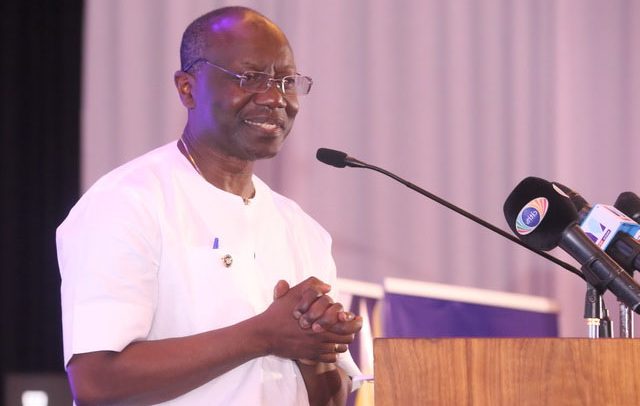Ken Ofori-Atta
Finance Minister Ken Ofori-Atta is set to present the mid-year review of the government’s Budget Statement and Economic Policy for the fiscal year 2023 on July 25, 2023.
Second Deputy Whip of the Majority, Lydia Alhassan, who disclosed this on the floor of Parliament last Friday, said the presentation is in line with the Public Financial Management Act of 2016 (Act 921).
She was presenting the explanatory memorandum on the Business Statement of the House for the seventh week ending Friday, July 21, 2023.
Lydia, who is also the NPP MP for Ayawaso West Wuogon, asked all lawmakers to take note of the date and avail themselves for the presentation.
The 2023 budget was themed: “Restoring and Sustaining Macroeconomic Stability and Resilience through Inclusive Growth and Value Addition.”
This year’s macroeconomic targets have overall Real GDP growth of 2.8 percent, Non-Oil Real GDP growth of 3.0 percent, with End-December inflation rate of 18.9 percent.
The Primary Balance on commitment basis of a surplus of 0.7 percent of GDP; and the Gross International Reserves to cover not less than 3.3 months of imports.
Medium Term Objectives
In the medium term, the government is hoping to restore fiscal and debt sustainability as well as minimise fiscal risks, including risk from contingent liabilities from SOEs.
It also wants to re-anchor inflation expectations, achieve low and stable inflation, and strengthen the exchange rate regime; deepen structural reforms, restore investor confidence, regain market access, and unlock other financing sources; and build buffers to strengthen resilience to economic shocks.
The government again wants to improve the country’s sovereign credit ratings and regain International Capital Market access as well as improve on vulnerability and efficiency of public expenditure.
Expectations are high in the face of the government’s plan to achieve overall Real GDP to grow at an average rate of 4.3 percent between 2023 and 2026, whilst Non-Oil Real GDP to grow at an average rate of 4.0 percent in the same period.
It expects inflation to be within the target band of 8±2 percent, Primary Balance on Commitment basis to average 1.3 % of GDP in the 2023-2026 period; and Gross International Reserves to cover at least four months of imports.
Programme
The government has prepared the Post-Covid-19 Programme for Economic Growth (PC-PEG) as a blueprint to overcome current economic issues.
The PC-PEG’s major objectives include, among other things, restoring fiscal and debt sustainability and minimising fiscal risks, particularly risk from contingent liabilities from SOEs.
Its goals are to re-anchor inflation expectations, achieve low and stable inflation, and reinforce the exchange rate regime; deepen structural reforms, restore investor confidence, re-establish market access, and open up additional funding sources; and construct buffers to increase resilience to economic shocks.
The programme also aims to improve Ghana’s sovereign credit ratings and re-establish access to international capital markets, as well as to strengthen domestic productive capacity and diversify the economy in order to achieve a value-added export-driven regime and produce goods and services for domestic consumption.
According to the government, this will provide for social protection programmes to protect the poor and vulnerable.
2022 Performance
To better evaluate the macroeconomic developments for the first three quarters of the year, the macroeconomic targets set for 2022 as presented in the 2022 Mid-Year Fiscal Policy Review had an overall Real GDP growth of 3.7 percent, Non-Oil Real GDP Growth rate of 4.3 percent, and End-period inflation of 28.5 percent.
It also had the overall fiscal deficit at 6.6 percent of GDP, with primary surplus of 0.4 percent of GDP, and Gross International Reserves sufficient to cover at least three and half months of imports of goods and services.
By Ernest Kofi Adu, Parliament House


